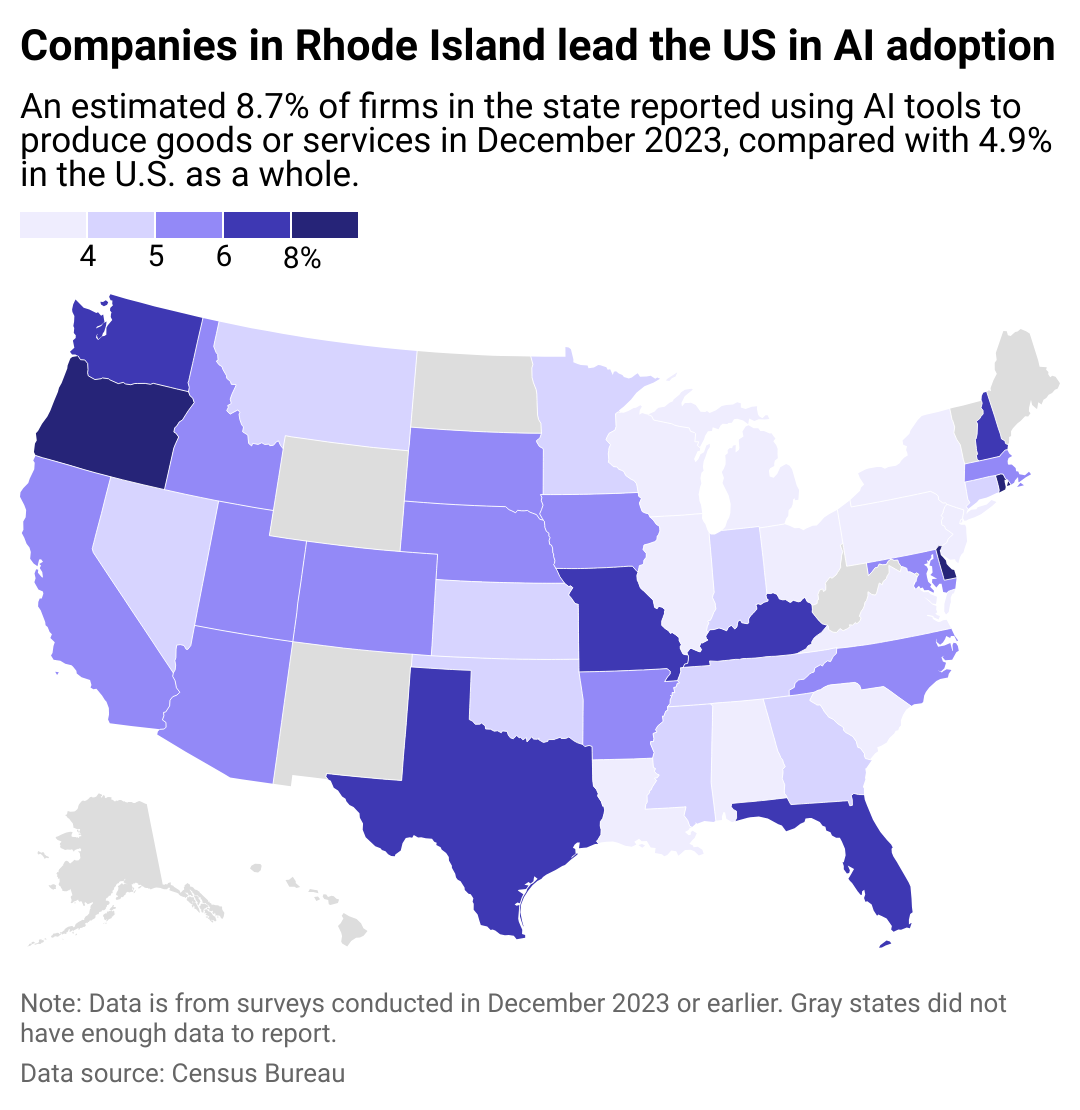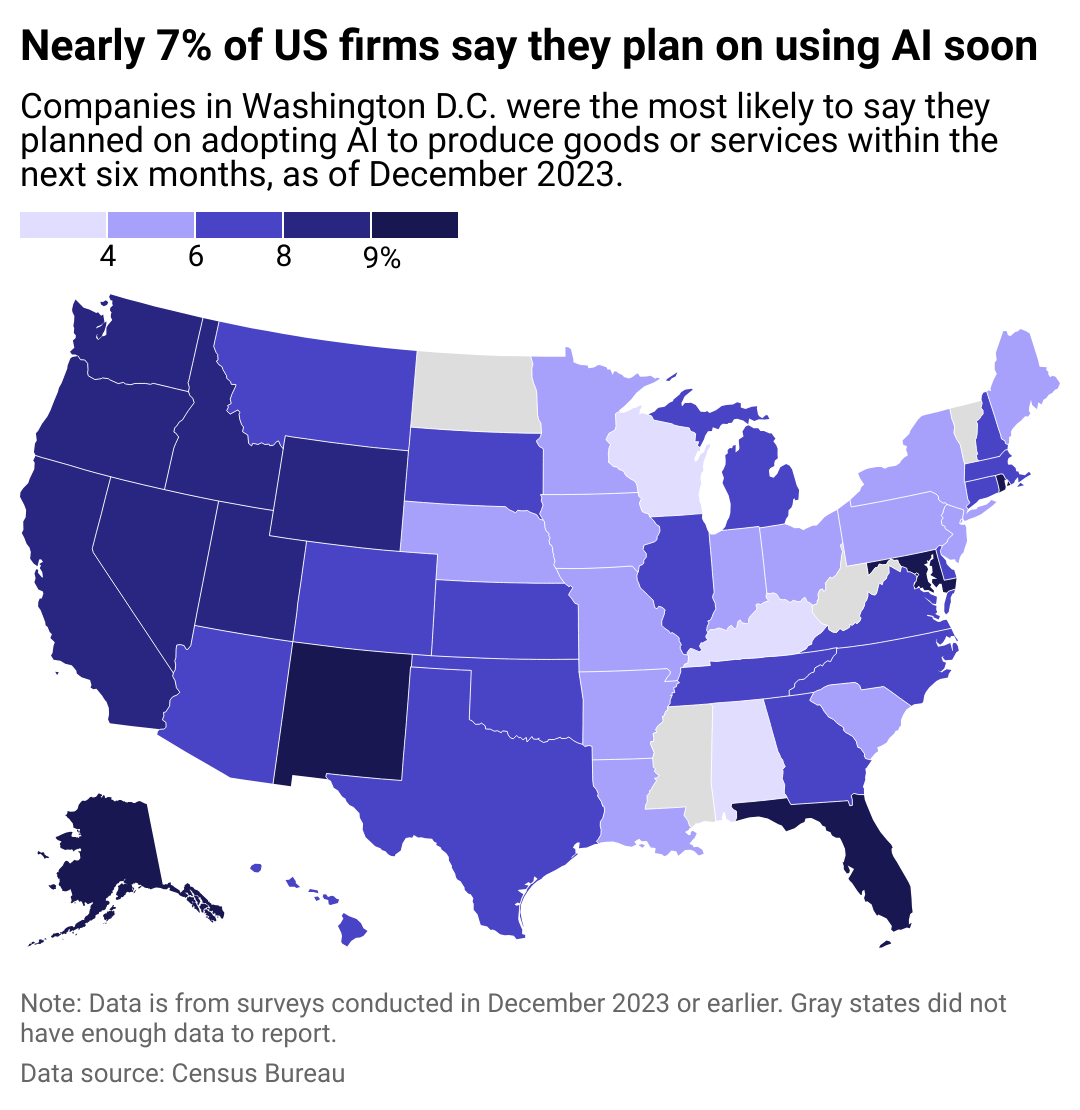
Where companies have adopted AI—and where they are planning to do so in the near future
This story originally appeared on Verbit and was produced and distributed in partnership with Stacker Studio.
Where companies have adopted AI—and where they are planning to do so in the near future
On Nov. 30, 2022, OpenAI launched ChatGPT, a chatbot driven by artificial intelligence. The app spread like wildfire. Not only did it provide an entertaining companion to chat with, but it also showed promise as a piece of productivity software.
ChatGPT allows users to ask questions about myriad topics and get useful responses in a way that search engines like Google cannot provide. Similar technologies have emerged in all kinds of domains, including image generation, language translation, transcription, computer programming, and more.
Firms across the U.S. are embracing artificial intelligence. To find out which regions are the most enthusiastic about AI, Verbit analyzed data from surveys taken by the Census Bureau in December 2023. Overall, 4.9% of businesses said they were using AI to produce goods or services in the past two weeks, while 6.7% say they plan to within the next six months.
Unsurprisingly, information technology companies are the most eager to use artificial intelligence—22% of respondents from American tech companies said they had used AI for their products or services within the past two weeks. That number actually understates AI's impact in the field. A survey of computer programmers conducted by JetBrains, a software company, found that 77% of respondents used ChatGPT, while 46% used GitHub Copilot, an AI coding assistant.
Professional, scientific, and technical services were the second-most likely type of firm to respond that they used AI tools, according to the Census Bureau. Law firms are using tools to scan through thousands of past cases. And, according to Tess Bennett, a technology reporter for Financial Review, consultants and accountants are using AI to create PowerPoint presentations and conduct exploratory data analysis.

Top adopters
Some businesses have been quicker to adopt AI than others. Companies in Rhode Island lead the way on this front—8.7% of businesses in the state are currently using AI, nearly twice the rate of companies in the United States as a whole.
Companies on the West Coast and the Southwest tended to be more AI-friendly, while companies in the Rust Belt were likelier to have the lowest interest in using AI tools.
This story matches the Census survey numbers with data on what kinds of companies each state has within its borders and the education level of its workforce to understand why these disparities across states exist.
In general, states with a higher share of businesses in the technology sector also were likely to have more businesses use AI to produce goods and services. However, the weak correlation suggests that despite all of the hype surrounding AI, companies have still been slow to change their practices to adopt the technology.

Getting on the bandwagon
Businesses in Washington D.C., were the most likely to say they planned to adopt AI in the next six months, at 13.7%. Meanwhile, about 9% of businesses in Maryland, Alaska, New Mexico, Rhode Island, and Florida said they planned on implementing AI. Alabama and Delaware were the least enthusiastic about AI adoption—only 3.3% of businesses in the two states reported plans to implement AI.
This analysis of Census data found a much stronger correlation between how many of a state's firms are in the tech sector and their willingness to implement AI in their business practices in the near future.
Similar trends were found when it came to states with highly educated workforces—in general, the higher the share of a state's residents with college degrees, the more likely its businesses were to say they were planning on implementing AI. Artificial intelligence might be the future. But Census data reveals it is still early days.
Story editing by Ashleigh Graf. Copy editing by Kristen Wegrzyn.



